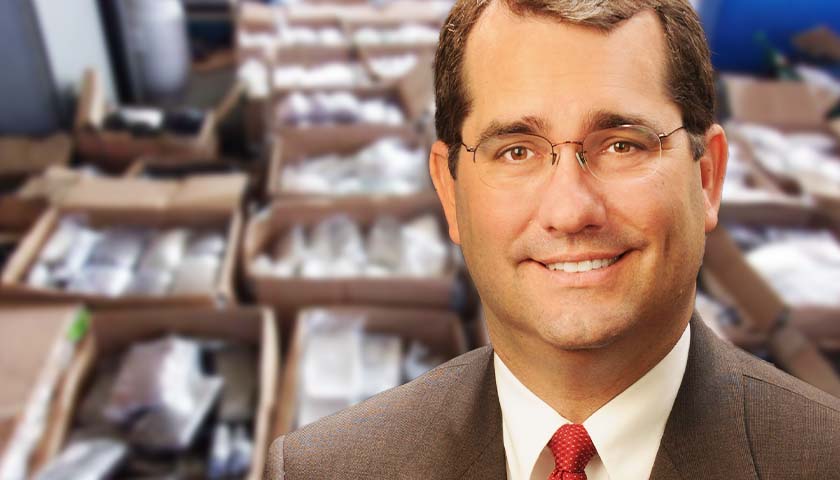by Bethany Blankley
Record amounts of fentanyl and other drugs are being seized in Kansas after they’ve made their way north from Mexico and the state’s attorney general, Derek Schmidt, said he is trying to stop it. He joined a coalition of other Republican attorneys general at the Texas-Mexico border to see first-hand how the Biden administration’s open border policies are contributing to crime in Kansas.
In one briefing with the Texas Department of Public Safety, the AGs learned that Texas state troopers alone had seized enough fentanyl last year to kill over 200 million people. They also arrested more than 10,000 illegal immigrants for committing state crimes, including for child trafficking and drug smuggling, seized over five tons of methamphetamine, and over $17 million in cash as part of Operation Lone Star, Texas’ border security initiative.
While it’s “good news that they’re seizing more, there’s no reason to think that there’s less of it eluding seizure at the border because the border’s wide open in large swaths,” Schmidt told The Center Square. “I don’t think it’s a good news number. I think it’s an indication of the increased volume coming across the border, not an indication of increased success in stopping it at the border.”
Schmidt visited Texas after authorities seized more fentanyl across Missouri, Kansas and southern Illinois last year than in the previous two years. The Drug Enforcement Agency – St. Louis division reported a record 188 kilograms of fentanyl seized last year compared to 82 kilograms in 2020 and 104 kilograms in 2019. DEA agents and task force officers also seized 1,848 kilograms of methamphetamine, 73 kilograms of heroin, 347 weapons, and $15.8 million in cash.
In 2021, Customs and Border Patrol agents also confiscated 319,447 pounds of marijuana, 190,861 pounds of methamphetamine, 97,638 pounds of cocaine, 202,820 pounds of khat (a stimulant that comes from a plant), and 73,872 pounds of other drugs, including prescription, chemical and other uncategorized drugs.
While attorneys general have cracked down on opioid manufacturers and states have beefed up their additional drug programs and resources over the past few years, drug overdoses continue to rise.
The synthetic opioid is primarily manufactured in Mexico after cartels receive precursors of the drug shipped from China. The finished product, often pills looking like prescription drugs that are laced with fentanyl, is brought into the U.S. through the southern border and distributed nationwide through an extensive network of drug traffickers.
Illicit fentanyl is more than 100 times stronger than morphine and 50 times stronger than heroin. Two grams, about the weight of a mosquito, is a lethal dose.
Last year, fentanyl was the leading cause of death among adults between the ages of 18 and 45 nationwide, according to CDC data.
While Kansas has traditionally dealt with methamphetamine and other drug overdoses, the most recent drug overdose death data show that fentanyl was responsible for half of its overdose deaths.
From April 2020 to April 2021, there were 558 drug overdose deaths in Kansas, a 45.7% increase from the previous year during the same time period.
According to Kansas Department of Health and Environment preliminary data, there were 338 fatal drug overdoses between Jan. 1, 2021, and June 30, 2021, a 54% increase from the same period in 2020. Among them, 149 involved fentanyl or fentanyl analogs, roughly 44%.
“This is largely attributed to increased availability, accessibility and use of illegally manufactured fentanyl statewide,” the state health department said. “Fentanyl is a powerful synthetic opioid that is often combined with other drugs, such as heroin and cocaine, or used as a standalone drug. Due to its potency, fentanyl-involved overdoses have a fast onset and may be difficult to reverse.”
Police departments throughout Kansas have been warning their communities that the number of people dying from pills laced with fentanyl is increasing.
“Fentanyl is a somewhat a new phenomenon in Kansas,” Schmidt told The Center Square, “layered on top of the long-standing problem with methamphetamine manufactured in Mexico and shipped across the border and distributed in our communities. That’s been true for well over a decade. Anecdotally, we’ve seen more meth on the streets today than we ever have, even more than when we had a clandestine lab problem 15 years ago when meth was being manufactured in abandoned houses, barns and car trunks. We solved that problem but the market is still there and it’s now being served by organized criminal organizations that take advantage of low risk of interdiction at the southern border.”
Kansans can call 866-645-8216 or go to FindTreatment.gov to locate treatment services by zip code and learn more information at PreventOverdoseKS.org.
– – –
Bethany Blankley is a contributor to The Center Square.
Photo “Derek Schmidt” by Attorney General’s Office. Background Photo “Border Patrol Drug Bust” by U.S. Customs and Border Protection.








